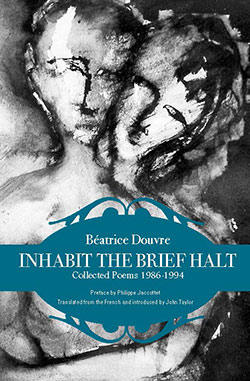THE BITTER OLEANDER PRESS LIBRARY OF POETRY
NEWEST SELECTED BOOK FOR 2025
INHABIT THE BRIEF HALT
by Béatrice Douvre
Translated from the French and introduced by John Taylor
Béatrice Douvre (1967-1994) was a poet and artist who passed like a comet through the sky of French literature. At the age of thirteen, she began suffering from anorexia, an affliction against which she would struggle throughout her short lifetime. Despite her illness, she managed to study French literature at the University of Nanterre, where she completed a master’s thesis under the direction of her professor, the poet Gabrielle Althen, about “anorexia and orexia in the Rimbaud’s oeuvre,” and then a D.E.A. thesis about “color in Yves Bonnefoy’s poetic oeuvre.” Also under Althen’s supervision, she was engaged in writing a doctoral thesis about Pierre Jean Jouve when she died from exhaustion and a heart attack on a train on 19 July 1994. At the time, she had published only a few poems, beginning in 1991, in various literary reviews, but some three hundred poems were found among her papers, as well as a remarkable diary, Journal de Belfort. During her last years, she had also met, and was encouraged by, several important French poets, including not only Althen but also Philippe Jaccottet, Yves Bonnefoy, and Jean-Yves Masson (who, like Althen, played a key role in publishing Douvre’s work and calling critical attention to it). Summing up her remarkable output, Masson observes: “Language was the body that she lacked.”
Now more than three decades after Béatrice Douvre’s death, her poetry continues to be passed from hand to hand. She is not a household name, but her name remains well-known to poets and readers of French poetry. She is a poet’s poet. By this I mean, alongside the strictly lexical, syntactic, and semantic aspects distinguishing her poetics, that her short life of twenty-seven years seems to have been fully given over to what Alain Blanc, the publisher of her collected poems, Oeuvre poétique, calls “the incandescent exercise of writing poems.” He adds that she was a “meteor avid for the absolute, burned with a lucid blindness, embodying poetry itself in her own way by accomplishing one of its highest missions.” And what is this mission? Blanc cites a sentence from Douvre’s diary, Journal de Belfort: “I baptized the foliage, my hands placed on ephemeral perfections.”
—John Taylor, from his introduction

